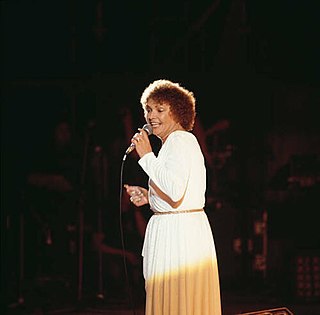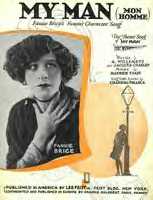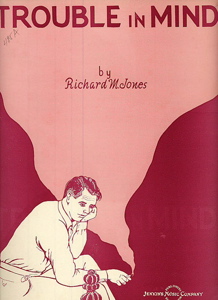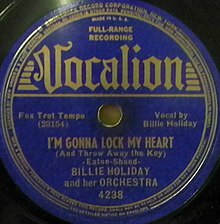"What Is This Thing Called Love?" is a 1929 popular song written by Cole Porter, for the musical Wake Up and Dream. It was first performed by Elsie Carlisle in March 1929. The song has become a popular jazz standard and one of Porter's most often played compositions.

Billie Jo Spears was an American country music singer. She reached the top 10 of the country music chart five times between 1969 and 1977, her biggest being "Blanket on the Ground", a 1975 number-one hit. She also had a large following in the United Kingdom with two of her singles reaching the pop top ten.
"'A' You're Adorable" is a popular song with music by Sid Lippman and lyrics by Buddy Kaye and Fred Wise, published in 1948.
"On the Sunny Side of the Street" is a 1930 song composed by Jimmy McHugh with lyrics by Dorothy Fields. Some authors say that Fats Waller was the composer, but he sold the rights to the song. It was introduced in the Broadway musical Lew Leslie's International Revue starring Harry Richman and Gertrude Lawrence.
Jake HammondsJr., known as Timmy Shaw, was an American R&B singer who recorded in the 1960s.

"The Way You Look To-night" is a song from the film Swing Time that was performed by Fred Astaire and composed by Jerome Kern with lyrics written by Dorothy Fields. It won the Academy Award for Best Original Song in 1936. Fields remarked, "The first time Jerry played that melody for me I went out and started to cry. The release absolutely killed me. I couldn't stop, it was so beautiful."

"A Fine Romance" is a popular song composed by Jerome Kern with lyrics by Dorothy Fields, published in 1936.
"I'll Get By " is a popular song with music by Fred E. Ahlert and lyrics by Roy Turk. The song was published in 1928. Versions by Nick Lucas, Aileen Stanley and, most successfully, Ruth Etting, all charted in America in 1929.
Lou Handman was an American composer.
"I'll Be Seeing You" is a popular song about missing a loved one, with music by Sammy Fain and lyrics by Irving Kahal. Published in 1938, it was inserted into the Broadway musical Right This Way, which closed after fifteen performances. The title of the 1944 film I'll Be Seeing You was taken from this song at the suggestion of the film's producer, Dore Schary. The song is included in the film's soundtrack.
"Everything I Have Is Yours" is a popular song.
"Ain't Nobody's Business" is a 1920s blues song that became one of the first blues standards. It was published in 1922 by Porter Grainger and Everett Robbins. The song features a lyrical theme of freedom of choice and a vaudeville jazz–style musical arrangement. It was first recorded, as "'Tain't Nobody's Biz-ness if I Do", in 1922 by Anna Meyers, backed by the Original Memphis Five.

Carmen McRae Sings Lover Man and Other Billie Holiday Classics is a 1962 studio album by Carmen McRae, recorded in tribute to McRae's idol, Billie Holiday, who had died two years previously.
"I've Got My Love to Keep Me Warm" is a popular song copyrighted in 1937 by its composer, Irving Berlin, and first recorded by (i) Ray Noble, Howard Barrie, vocalist, and (ii) Red Norvo, Mildred Bailey, vocalist. The song – sung by Dick Powell and Alice Faye – debuted on film February 12, 1937, in the musical, On the Avenue.
"Isn't This a Lovely Day?" is a popular song written by Irving Berlin for the 1935 film Top Hat, where it was introduced by Fred Astaire in the scene where his and Ginger Rogers' characters are caught in a gazebo during a rainstorm. The lyric is an example of a song which turns a bad situation into a love song, a common style for Irving Berlin, as in I've Got My Love to Keep Me Warm and Let's Have Another Cup of Coffee.
What's New?" is a 1939 popular song composed by Bob Haggart, with lyrics by Johnny Burke. It was originally an instrumental tune titled "I'm Free" by Haggart in 1938, when Haggart was a member of Bob Crosby and His Orchestra. The tune was written with a trumpet solo, meant to showcase the talents of band-mate Billy Butterfield. Crosby's orchestra recorded "I'm Free" the same day it was written.
"I Can't Get Started", also known as "I Can't Get Started with You" or "I Can't Get Started ", is a popular song. It was written in 1936 by Vernon Duke (music) and Ira Gershwin (lyrics) and introduced that year in the film Ziegfeld Follies of 1936, where it was performed by Bob Hope and Eve Arden.

"Mon Homme" ,also known by its English translation, "My Man", is a popular song first published in 1920. The song was originally composed by Maurice Yvain with French lyrics by Jacques-Charles and Albert Willemetz. The English lyrics were written by Channing Pollock.

"Trouble in Mind" is a vaudeville blues-style song written by jazz pianist Richard M. Jones. Singer Thelma La Vizzo with Jones on piano first recorded it in 1924 and in 1926, Bertha "Chippie" Hill popularized the tune with her recording with Jones and trumpeter Louis Armstrong. The song became an early blues standard, with numerous renditions by a variety of musicians in a variety of styles.

Johnny Mathis has recorded 73 studio albums, 18 of which achieved sales of 500,000 units and were awarded Gold certification by the Recording Industry Association of America. Five of his greatest hits albums also accomplished this, and of these 18 Gold albums, six eventually went Platinum by reaching sales of one million copies. In 1999, sales figures totaled five million for his first holiday LP, Merry Christmas, and three million for Johnny's Greatest Hits, a 1958 collection that has been described as the "original greatest-hits package" and once held the record for most weeks on Billboard magazine's album chart with a total of 490. His second longest album chart run was the 295 weeks belonging to his Platinum 1959 album Heavenly, which gave him five weeks in the top spot. In a ranking of the top album artists of the last half of the 1950s in terms of Billboard chart performance, he comes in at number two, for the 1960s, number 10, and for the period from 1955 to 2009 he is at number six.







